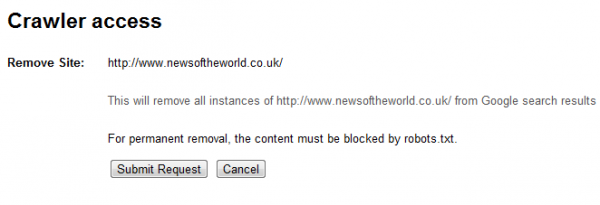Google Disables URL Removals After Bug Allows Anyone To Remove Any Site
This morning, James Breckenridge discovered a loophole within Google’s Webmaster Tools that allowed anyone to remove any site from Google. Both James and I sent this information to Google as soon as we heard of it. After several hours, Google has told us, “we’re still investigating this report, and to be cautious we disabled all […]

Both James and I sent this information to Google as soon as we heard of it. After several hours, Google has told us, “we’re still investigating this report, and to be cautious we disabled all URL removals earlier this morning.” So now, if you even own a site, you won’t be able to remove the site or pages from the site using Google’s URL removal tool.
How did this loophole work? Pretty simple as James described. You use the following URL when logged into Google Webmaster Tools:
https://www.google.com/webmasters/tools/removals-request?hl=en&siteUrl=https://{YOUR_URL}/&urlt={URL_TO_BLOCK}
Then replace {YOUR_URL} with a URL you control within Webmaster Tools, and replace {URL_TO_BLOCK} with the URL of the site you want to block.
You could block a whole site, section or single page this way, based on how you entered the URL. To block a site, use the top level domain (E.g. https://www.someurl.com/), to block a section (subfolder) use a subfolder URL (E.g. https://www.someurl.com/somefolder/) and to block a page use the specific page URL (E.g. https://www.someurl.com/somefolder/somepage.html).
I am waiting an update from Google on why this happened, if site’s were impacted and how long this was an issue.
Postscript:: Google sent us a statement that they have fixed the issue. A Google spokesperson said:
We’ve confirmed that there was an issue within the URL removal feature in our Webmaster Tools and have already pushed out a fix and re-enabled URL removals.
The URL removal feature keeps detailed records, so we’re currently reprocessing earlier removal requests to ensure their validity. Our initial examination has shown only a limited impact.
Related stories
New on Search Engine Land
